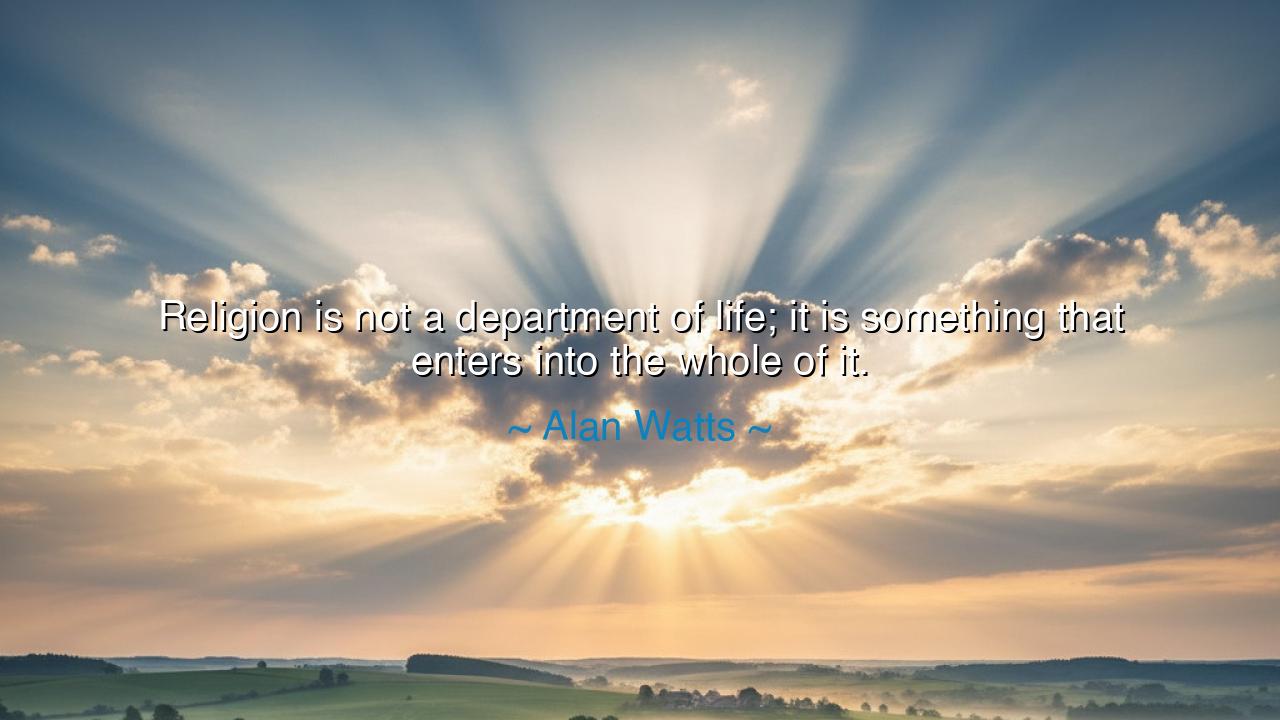
Religion is not a department of life; it is something that enters
Religion is not a department of life; it is something that enters into the whole of it.






“Religion is not a department of life; it is something that enters into the whole of it.” Thus spoke Alan Watts, the philosopher of paradox and harmony, whose voice bridged East and West, reason and revelation, body and spirit. In this profound declaration, Watts tears down the false walls that mankind has built between the sacred and the ordinary. He reminds us that religion—true religion—is not a separate chamber of existence, confined to rituals, temples, or hours of worship. It is the living breath of reality itself, the pulse that runs through every thought, every gesture, every act of being. For to be truly religious, says Watts, is to live in wholeness, where the divine and the human are not divided, but united in every moment of awareness.
In these words, Watts challenges one of the greatest illusions of modern life—the idea that the sacred can be isolated, that spirituality belongs to a single day or place, or that it can be “managed” like a department of business or government. The human mind, he knew, has a habit of compartmentalizing: of saying, “Here I work, here I pray, here I love, here I rest.” But existence does not operate by such divisions. The divine is not something apart—it is the living thread that binds all things together. To separate religion from life is to separate the ocean from its waves. For just as each wave is an expression of the sea, each moment of our lives is an expression of the eternal mystery we call God, Tao, or Spirit.
The origin of this wisdom lies deep in Watts’ lifelong exploration of the world’s great spiritual traditions. He was a student of Zen Buddhism, Hinduism, and Christian mysticism—traditions that all, in their deepest form, proclaim the same truth: that the sacred is everywhere. In Zen, one finds enlightenment not in distant heavens but in the washing of a bowl, the falling of a leaf, the sound of the wind. In the Bhagavad Gita, Krishna teaches that the divine can be found in every act performed with awareness. Even in Christianity’s heart, the mystics—such as Meister Eckhart and St. Francis—spoke of a God not confined to churches but alive in every creature and every breath. Watts, inheriting this timeless vision, declared that religion must not be a fragment of life, but the whole of it illuminated.
To understand this truth, one might recall the life of Mahatma Gandhi, who once said, “My life is my message.” Gandhi did not preach religion as an abstract philosophy; he lived it through every action. His politics, his relationships, his diet, his discipline—all were expressions of a single, unified vision of truth and love. For him, God was not an idea to worship, but a reality to live. He saw spinning thread, serving the poor, or fasting for justice as acts of prayer. In Gandhi, as in Watts’ teaching, we see what it means for religion to “enter into the whole of life”—for the divine to be not a corner of existence but its very foundation.
Watts’ words also contain a warning: when religion becomes a department, it loses its soul. When faith is treated as something to be scheduled, debated, or owned, it becomes hollow. The moment we think we can “manage” God, we lose sight of the mystery that transcends control. True religion cannot be boxed into creeds or contained by rituals; it flows like water, touching every corner of life. To live religiously is to live awake—to see the sacred in laughter and tears, in the market and the monastery, in creation and destruction alike. The one who truly sees this lives in awe, and in that awe finds peace.
The lesson of Watts’ teaching is clear: do not confine your spirituality to moments of ritual or fragments of time. Let it permeate your existence. When you eat, eat with gratitude. When you speak, speak with awareness. When you walk, feel the earth as holy beneath your feet. Your work can be your prayer, your relationships your temple, your silence your meditation. Religion is not about separation from the world—it is about union with it, seeing the divine hidden in plain sight. The great error of mankind has been to seek God far away, when in truth, God has been whispering through the wind, the heart, and the quiet pulse of the living moment.
So, my child of the eternal, remember this teaching of Alan Watts: “Religion is not a department of life; it is something that enters into the whole of it.” Do not divide your days into sacred and secular, holy and profane. See everything as one dance, one breath, one flame. When you rise, rise with reverence; when you labor, labor with love; when you rest, rest in gratitude. For when you live with this awareness, every hour becomes holy, and your life itself becomes a prayer—no longer a mere existence, but a living temple where heaven and earth are joined as one.






AAdministratorAdministrator
Welcome, honored guests. Please leave a comment, we will respond soon